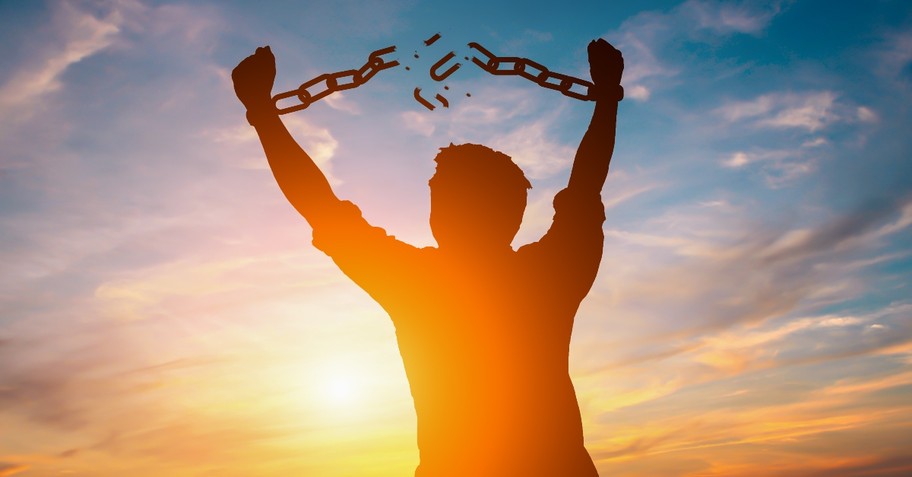How to Forgive Yourself after Falling into Sin

Forgiveness is the demonstration of God’s grace to us in our fallen and sinful state, a free gift from God through Christ (Rom. 5:15). The death of Christ on the cross demonstrated God’s love for us, even in our sinfulness (Rom. 5:8), and provided the means of transformation from death to life (1 Jn. 3:14), from enemies to children of God (Rom. 5:10). As God’s children, we have access to a relationship with Him as our Father (John 14:9), able to express our gratitude, desires, needs, and requests (Matt. 6:9-13). Our sins are forgiven through the death of Christ and fellowship and relationship are maintained by abiding in Christ (Jn. 15:4), walking in the light (1 John 1:7), and confessing our sins and failures (1 John 1:9).
The Gospel is the truth about God and the truth about ourselves. The truth about God is that God is love and He demonstrated His love toward me by sending His Son to die on the cross for my sins (1 Cor. 15:3), being raised on the third day to show His power of sin and death (1 Cor. 15:20). The truth about me, and us, is that we are dead in our transgressions and sins, lost without a Savior (Luke 19:10). We need God’s forgiveness to be no longer dead but alive in newness of life (Rom. 6:4), and while this is a universally acknowledged concept by Christians, the struggle occurs in the realization of our need for God’s continued forgiveness and our reflection of His forgiveness in this vertical relationship to our horizontal relationships.
In the beginning, God created us in perfect relationship with Himself, one another, ourselves, and creation (Gen. 2:24-25). Sin disrupted each of these relationships, distorted our view and awareness of self, trust and relationships with others, trust and relationship with God, and struggle and pain with creation (Gen. 3:14-19). As Jesus explained in His model of prayer in Matthew 6, our experience of God’s forgiveness both ultimately and daily should influence our capacity and desire to forgive others. Forgiving others can be hard because it means that we release our right for justice in being wronged in some way. But what about how to forgive ourselves? Why is it so difficult to forgive ourselves when we fall into sin and what does it mean when we can accept God’s forgiveness and extend forgiveness to others, but not forgive ourselves? How can we learn to stop the sin cycle and forgive ourselves?
Photo Credit: ©GettyImagesRawpixel
Does the Bible Talk about How to Forgive Yourself?
Jesus explained that our experience of forgiveness from God should motivate us toward forgiveness of others (Matt. 6:14-15), expounding the importance of perpetuating forgiveness toward others with negative examples in the parable of the unforgiving servant (Matt. 18:23-35). The Bible is clear that we are to forgive others because of the depth of our own forgiveness, but does the Bible talk about how to forgive yourself?
Forgiveness and compassion are related concepts with Jesus feeling compassion and providing forgiveness (Matt. 14:14). Compassion is the expression of care, concern, and love toward someone else with self-compassion then being the ability to understand, love, and care for yourself. Being created in the image of God means that even in our sinful, fallen state, we have inherent worth and value as humans (Gen. 1:27). The Bible directs the call and expectation to love God and love others, the two greatest commandments, from a position that assumes we love and have compassion for ourselves. In explaining the Greatest Commandment, Jesus says, “And you shall love the Lord your God with all your heart and with all your soul and with all your mind and with all your strength. The second is this: You shall love your neighbor as yourself. There is no other commandment greater than these” (Mark 12:30-31).
Paul makes a similar assumption, explaining how “Husbands should love their wives as their own bodies. He who loves his wife loves himself. For no one ever hated his own flesh, but nourishes and cherishes it, just as Christ does the church, because we are members of his body” (Eph. 5:28-30). Putting off the old self and putting on the new self requires a transformation of identity and value. We are no longer defined by the behaviors and sins with which we were once identified, but now identify with the Kingdom of God through the washing, sanctifying, justifying power of Jesus Christ and the Holy Spirit (1 Cor. 6:11). Self-forgiveness or self-compassion is the necessary step of seeing ourselves the way that God sees us and walking according to that new reality (Eph. 4:17).

Understanding Why We Continue to Fall into Sin
Sin affects us from both inside and outside. While we have been redeemed by the blood of Christ and are being sanctified, we still reside in our fleshly body and must contend through the Spirit against the desires of the flesh (Rom. 7:15-24; Gal. 5:16-17). We continue to sin because we reside in a sinful and mortal body, groaning for redemption from this body of sin, waiting for the resurrection and our glorification (Rom. 8:23), but as John explains, our lifestyle and practices should be defined by the light of truth, living in obedience to God’s commandments to love Him and love others (1 John 1:7).
Walking in the light assumes the continued exposure of the darkness of sin and the removal of the entanglements and burden of sin along this journey (Heb. 12:1-2). Our continuation in sin may demonstrate a divided loyalty and focus on our attention, direction, and walk. The direction of our focus determines the direction of our walk and the attention of our desires (1 Peter 1:13-16). The guilt that we experience when we sin can cause us to wallow in remorse, self-pity, or shame. These guilty feelings are unhealthy and unhelpful because they are self-focused and have no means for resolution or abdication. If our sin only produces self-recrimination and self-pity, our focus is on ourselves and our need to feel better. In this situation, our desire is not confession or restitution, but the removal of our subjective feelings of guilt, perpetuating repeated cycles of sin.
Gary Collins explains that “Many Christians… go through repeated cycles of sin, guilt feelings, confession, temporary relief, and then more sin. For some, 1 John 1:9 ‘has come to be used as a kind of psychological spot remover for emotional guilt,’ but there is no change. This is because the confession is based on a selfish motive that may not even be conscious - to get relief from guilt feelings. As soon as the relief is experienced, the person feels free to sin again and the cycle is repeated” (Collins, Christian Counseling, p. 180). Stopping this cyclical struggle with sin requires a change in our process and focus.
Photo Credit: ©iStock/Getty Images Plus/francescoch
How to Forgive Yourself according to the Bible, after Falling into Sin
How to forgive yourself according to the Bible: Grief, sorrow, and guilt over sin are designed to alert us to the objective reality of our separation from a relationship with God. The feelings of guilt connect to the reality of guilt and require a shift in focus from ourselves to God as the offended party and the means of forgiveness and change. Paul contrasts subjective guilt feelings and this cycle of sin and guilt with Godly grief and sorrow, noting how “Godly grief produces a repentance that leads to salvation without regret” (2 Cor. 7:4).
Forgiving ourselves after falling into sin must first begin with repentance to God and His forgiveness. Confess your sins to God and to someone else so that you can experience the healing of restoration and accountability for change, breaking the power of secret shame and guilt that sin holds over you. The shame of sin held hidden becomes a prison of perpetual guilt that powers the continuation of sin in your life. Speaking through confession disrupts our dysfunctional or ungodly thinking and directs the light to our standards for self with its recrimination and defeat. Is our standard for repentance, holiness, etc. higher or stronger than God’s standard? If our standard or expectation for forgiveness is more stringent than God’s standard, who then is the god in our life? Forgiving yourself requires recognizing and admitting your sin (Lam. 3:40), repentance through confession to God and sometimes others (Lk. 5:32), receiving God’s forgiveness (Rom. 5:16), and actualizing that acceptance and forgiveness through changed behavior in the power of the Holy Spirit (Rom. 8:10-11).
The love of Christ and His forgiveness changes our allegiance and affections, transforming us as new creatures designed as ministers of reconciliation of the world to Christ and us to one another (2 Cor. 5:14-21). Forgiveness comes from God who loves us completely and unconditionally, calling us to love Him, others, and ourselves the same (Mk. 10:31-32). Self-forgiveness requires the full acceptance of God’s love for us and a willingness to depend fully and only on God’s perspective. If God forgives us and loves us, but we struggle to forgive and love ourselves, then we make ourselves God, dividing our loyalties and living in disobedience to God’s commands (John 15:12-14).
Further Reading
Bible Verses about Forgiving Yourself
Why Is it So Hard to Forgive Ourselves?
Related Resource: Listen to our FREE podcast, Teach Us to Pray with Christina Patterson. You can find all the episodes on LifeAudio.com. Listen to our episode on desperate prayers right now:

How to Forgive Yourself: A Summary
Being caught in a cycle of sin can produce feelings of guilt and shame, perpetuating the cycle as the goal becomes the removal of guilty feelings and not repentance, confession, and change through the power of the Holy Spirit. It is God who forgives sin, providing both the standard and the means for holiness through the work of Christ and the power of the Spirit. Because your focus determines the direction of your thoughts, feelings, and behaviors, stop focusing on yourself and your sin, frustrated and defeated within this guilty cycle and instead, confess your sins to God, seek accountability by confessing your sins to another to break the bond of shame over sin (Ps. 32:3-7), and receive God’s love and forgiveness, walking in the light (Eph. 5:8-9,13; 1 John 1:7) and renewing your mind through alignment with His Word (Rom. 12:2; 1 Peter 1:13-14).
God loves you and provides forgiveness and relationship with His Son through the cross (Rom. 8:1-8). We will continue to struggle while we wait for our turn at resurrection, but know that the standard for our forgiveness is much higher than we could ever imagine and we are more sinful than we would believe, but that standard was met by Christ at the cross and we are more loved than we could ever imagine. Loving God completely means seeing ourselves and others the way that He does, loving ourselves and others, and forgiving ourselves and others because that is what God has done.
Photo Credit: © Getty Images/Moostocker
Originally published August 23, 2021.





